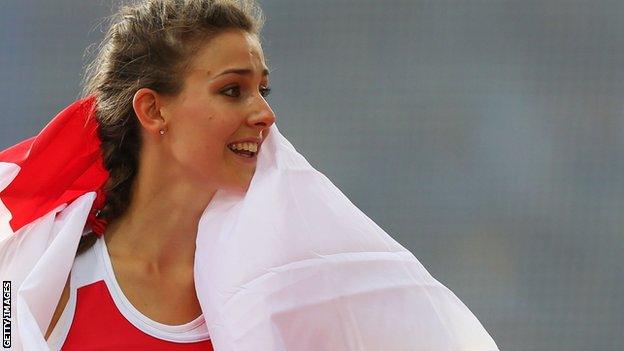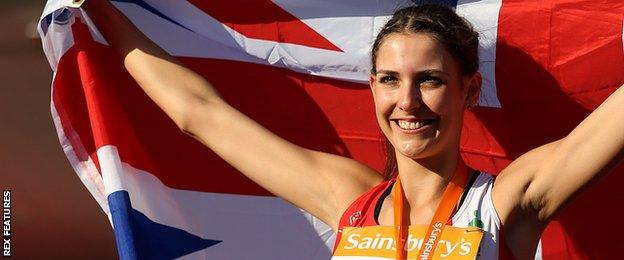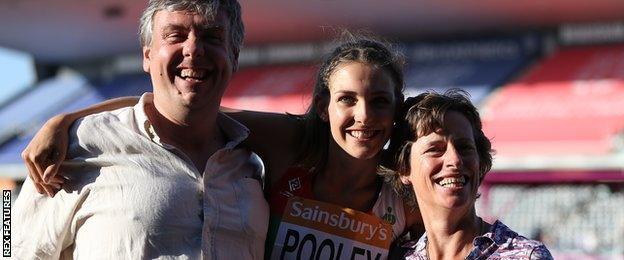Isobel Pooley: My job is a lifestyle, not a career
- Published

Isobel Pooley won silver at Glasgow 2014, her first major senior medal
British high jumper Isobel Pooley is currently working towards a place in Team GB's squad for the 2016 Rio Olympics.
The 22-year-old, who won a silver medal for England at the 2014 Commonwealth Games, set a new British record in outdoor competition of 1.97m earlier this year.
In her first column for the BBC Sport website she discusses her "job" as an athlete, family festivities and positive thinking.
A lifestyle not a career
My job as a full-time athlete is far more immersive than a normal nine-to-five job - it's an entire lifestyle.
My sporting ambitions shape almost every decision as I strive to build and maintain the ultimate physique for jumping high. It's my responsibility to nurture, protect and respect my body so that it can reward me with world-class performances.
However, an equally vital aspect that often gets overlooked is the mental and emotional excellence required in order to truly fulfil one's potential. Just as I can't detach myself from my physical body and its needs, nor can I live anywhere but inside my own head and within my own set of emotions.
Thus it's essential for my wellbeing that I learn to channel my thoughts and feelings in a positive and empowering direction so that success becomes more and more inevitable.
Building blocks

Pooley jumped 1.97m to win gold at the British Championships in July
At the moment we are in the middle of winter training, which is when we lay down the foundations for the next year in terms of fitness, strength and technique. It's the toughest part of the whole year and involves the highest volume of training and requires a diligent and steadfast approach.
It's useful to have short and long-term goals and to keep them in mind as much as you can. In my case a short-term goal might be just to survive the next set of exercises and execute them to a great standard.
Alternatively, I might focus on training as hard as possible for the next week, knowing that I have a recovery period coming up afterwards. This keeps my mind on the task in hand and stops me from getting lost in the sheer volume of training I have to contend with.
Quality, quantity and long-term goals
Since high jump is very technical, it's imperative to keep the quality as high as possible, so this approach helps me to concentrate my effort rather than just getting through it and diluting the overall standard of work.
In the long term, it's easy to imagine what my motivation is, with the World Indoor Championships, European Championships and Olympic Games just around the corner. I am so grateful that I have these incredible opportunities open to me and I am determined to make the absolute most of them.
I also like to look back on past successes - and disappointments - to galvanise myself for future challenges.
Power of positivity

"My family are so dear to me. I always miss them while I am in the Midlands training"
I make a conscious effort to see the positives in any situation and to take delight in even the simplest pleasures and the smallest successes. Every evening I also mentally run through the day's events and re-live the best moments in order to feel uplifted and energised for the next day.
Small steps like this help to keep me habitually optimistic, resilient and grateful, which makes life a pleasure and in many ways feels like a success in itself, even without the sporting benefits.
I am learning to appreciate that my body and mind are one integrated system and I need to listen to them both and cherish them equally. Think of it this way - it's hard to jump high if you have a grumbly ankle, but equally tough with a heavy heart.
With the belief that anything is possible I feel empowered to pursue my dreams with everything I have got.
Family festivities
I am really looking forward to spending some time with my family in a couple of weeks' time as they are so dear to me and I always miss them while I am in the Midlands training.
The following month, it will be great to relax and recuperate a little over Christmas, secure in the knowledge that I will have conquered the toughest training challenges in the October-December period.
In the new year, I have indoor competitions starting in January, which I am very excited about as they will be a chance to reap the benefits of all this hard work!
- Published10 November 2015

- Published9 November 2015
- Published15 July 2015

- Published10 November 2015
- Published9 November 2015
